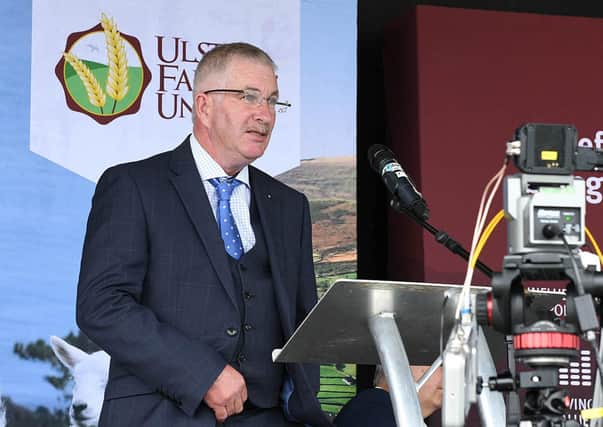Brexit deal has been long awaited, says UFU


UFU president Victor Chestnutt said: “This is good news for Northern Ireland’s (NI) agriculture industry and is the start of a new beginning. However, many challenges lie ahead for farming following this historic Brexit breakthrough, from establishing new trade deals to designing a domestic agricultural policy.
“Since the Brexit referendum result the UFU has been lobbying to achieve the best possible outcome for NI farmers. Our aim has always been focused on ensuring free and frictionless trade could continue north/south and east/west.
Advertisement
Advertisement
“The trade deal means that like NI, there will be no tariffs or quotas applied on trade between the EU and Great Britain (GB).
“We do need to analyse and fully consider the potential for regulatory divergence between GB and the EU, as the controls and procedures which NI now faces are changing unrecognisably,” added Mr Chestnutt.
“A lot of lobbying with both the UK Government and the EU will be needed to try and mitigate against the worst impacts of these changes to ensure that we have time to adjust and can keep trade flowing.”
Northern Ireland food and drink industry leaders have cautiously welcomed the free trade agreement reached between the United Kingdom and the European Union, as the Brexit transition period comes to an end.
Advertisement
Advertisement
Northern Ireland Food and Drink Association (NIFDA) Chair Nick Whelan said that, while preferable to a no-deal scenario, there is still clarity needed around bureaucracy and dispute resolution.
Nick Whelan said:“For the past four years the Northern Ireland food and drink industry has warned consistently of the dangers of any Brexit outcome that would increase barriers to trade or disrupt supply chains north-south or east-west. The agri-food industry on these islands is highly integrated, and anything less than frictionless trade between Northern Ireland, Great Britain and the Republic of Ireland will add costs and reduce choice to the consumer, and ultimately cost livelihoods.
“As was the case when the Withdrawal Agreement was agreed, this deal is welcome insofar as it takes us from the cliff edge - but it is far from perfect, and we still need clarity on a number of key areas. If the Northern Ireland protocol is to be durable, the UK and EU will need to address the challenges to local consumers of reduced choice and increased cost as a result of new administrative burdens on GB – NI trade. Additionally, we need a fair arbitration system to be in place from day one as there will be errors and teething problems as we come to terms with new procedures, and we want to minimise waste.
“The food industry is working very hard to maintain continuity of supply throughout the Covid-19 pandemic. Our key workers across the food supply chain – farmers, food factory staff, delivery drivers, retail assistants and everyone in between – have really stepped up to the plate to ensure food has stayed on the shelves over the past nine months. The additional bureaucracy required as a result of the deal does not make this challenge easier, but leaving without a deal would have magnified it and brought serious pressure on the industry at the worst possible time.
Advertisement
Advertisement
“Agri food is Northern Ireland’s biggest manufacturing industry. Northern Ireland food and drink is key stakeholder to drive economic recovery and the prosperity of Northern Ireland in the coming decade. It is one of the few sectors in Northern Ireland to have announced increased investment over recent months. With the right support we can continue to grow even stronger, and make the most of any opportunities that will be presented post-Brexit.”